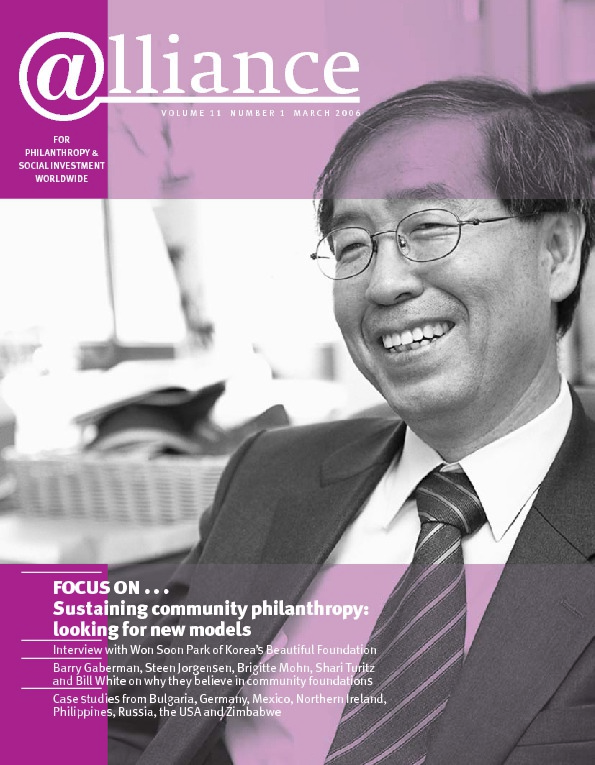Giving is instinctive for communities in Africa, and retracing and refining this time-honoured ethos was what led to the formation of the Community Foundation for the Western Region of Zimbabwe (CFWRZ), officially launched in March 1998. Eight years on, CFWRZ, the first community foundation in Zimbabwe, has strategically leveraged international philanthropy for community development through its Qogelela Fund.
Qogelela is a Ndebele word meaning to collect with the aim of saving or preserving for future use. Our aim, through the fund, is to show that the true value of giving is not in making attention-seeking donations but in creating positive community change through social investment. The idea of community philanthropy as a means of doing this is beginning to gain ground in Zimbabwe.
We realized, through working with communities spanning three provinces in Matabeleland North, Matabeleland South and the Midlands in Zimbabwe, that Qogelela was something that was already inherent in the culture and traditions of those communities. We merely tapped into this tradition, modified it, steered it towards the formation of a fully-fledged foundation and marketed the concept to donors, nationally and overseas.
A small, but significant contribution
A total of 50,000 people living in the rural communities of the western region of Zimbabwe contributed to the Qogelela Fund. At only 1 per cent, the proportion of the money contributed by Zimbabweans is small but nevertheless gives a great sense of ownership.
Moreover, the fact that communities have been prepared, even under the extreme circumstances in which they live, to contribute towards their own advancement has been a significant factor in persuading donors to step in. Donors feel safe investing their money where local communities have also put their own, and there is a better chance of success and sustainability as communities want to protect their own assets as much as donors do.
Advantages of a broad donor base
Being able to draw on a broad donor base rather than relying on a few wealthy individuals makes an obvious difference to a foundation’s long-term security and its effectiveness. Having fewer donors tends to restrict the number and type of programmes to be funded, as funds may be restricted, and perpetuates the unpalatable dependency syndrome, which has been a weakness in human development in much of Africa. There are also questions about control and what would happen if donors change their attitudes – and funding priorities – part way through emerging programmes.
By contrast, a broad donor base provides security for community programmes in areas such as women’s economic empowerment, water, HIV/AIDS, youth and child development. Besides, the more donors invest in the foundation, the wider is the exchange of skills, technical know-how and creative ideas to strengthen the programme impact.
The Qogelela endowment thus provides a stable source of funding for the Foundation’s grantmaking activities. The endowment currently stands at US$108,704 (this includes all contributions and the capital assets/buildings). Our aim is to increase this to $5 million over the next ten years to guarantee a substantial funding base for future sustainability.
The future
The Foundation sees buying property as a good way of increasing its endowment and income since properties appreciate in value even during the worst times. In 2000, CFWRZ purchased an old residential home, which it extended and renovated to be its permanent base. Two years later, it purchased another property, which it sub-lets and from which it realizes $200 a month.
In the uncertain economic and political situation of Zimbabwe, the future sustainability of community foundations such as ours remains in question. Against this background, the $5 million goal will remain pie in the sky unless the international philanthropy movement notices the potential of spreading community investment in Zimbabwe. While the challenges of operation and viability have overshadowed some of our work, our Qogelela Fund continues the multi-pronged approach to fund- building which has empowered economically disadvantaged communities in the western region of Zimbabwe.
Inviolatta Moyo is the Executive Director of the Community Foundation for the Western Region of Zimbabwe (CFWRZ). She can be contacted at westfund@mweb.co.zw





Comments (0)